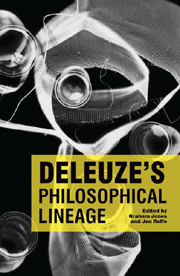Book contents
- Frontmatter
- Contents
- Acknowledgements
- List of Abbreviations
- Introduction: Into the Labyrinth
- 1 Plato
- 2 John Duns Scotus
- 3 G. W. F. Leibniz
- 4 David Hume
- 5 Immanuel Kant
- 6 Solomon Maimon
- 7 G. W. F. Hegel
- 8 Karl Marx
- 9 Hoëne Wronski and Francis Warrain
- 10 Bernhard Riemann
- 11 Gabriel Tarde
- 12 Sigmund Freud
- 13 Henri Bergson
- 14 Edmund Husserl
- 15 A. N. Whitehead
- 16 Raymond Ruyer
- 17 Martin Heidegger
- 18 Pierre Klossowski
- 19 Albert Lautman
- 20 Gilbert Simondon
- Bibliography
- Notes on Contributors
- Index
7 - G. W. F. Hegel
Published online by Cambridge University Press: 12 September 2012
- Frontmatter
- Contents
- Acknowledgements
- List of Abbreviations
- Introduction: Into the Labyrinth
- 1 Plato
- 2 John Duns Scotus
- 3 G. W. F. Leibniz
- 4 David Hume
- 5 Immanuel Kant
- 6 Solomon Maimon
- 7 G. W. F. Hegel
- 8 Karl Marx
- 9 Hoëne Wronski and Francis Warrain
- 10 Bernhard Riemann
- 11 Gabriel Tarde
- 12 Sigmund Freud
- 13 Henri Bergson
- 14 Edmund Husserl
- 15 A. N. Whitehead
- 16 Raymond Ruyer
- 17 Martin Heidegger
- 18 Pierre Klossowski
- 19 Albert Lautman
- 20 Gilbert Simondon
- Bibliography
- Notes on Contributors
- Index
Summary
In a perceptive review of Gilles Deleuze's influential Nietzsche and Philosophy (1983), Jean Wahl remarks that Deleuze's resentment and “ill feeling” (mauvaise humeur) towards Hegel sometimes impair Deleuze's otherwise brilliant critique of Hegel. Of all the major philosophers discussed by Deleuze (including Plato, Lucretius, Leibniz, Spinoza, Kant, Nietzsche and Bergson), Hegel receives by far the least sympathetic treatment; whereas in all the other cases, Deleuze is able to retrieve something useful for his own philosophy, his critique of Hegel is almost unrelentingly negative. In a philosophy that celebrates the affirmation of difference, such negativity may come as a surprise, and even seem ironic.
Yet Deleuze's rejection of Hegel, from start to finish, rests on the firm conviction that Hegel's philosophy has betrayed difference by making difference into something negative (negation, opposition, contradiction), and it is against this Hegelian negativity that Deleuze so tirelessly inveighs. Deleuze's Nietzschean critique of Hegel is well known: the negative conception of difference is the expression of the ressentiment of those who suffer because they turn their own forces against themselves and make ‘reaction’ their ‘creative act’. ‘For the affirmation of difference, [Hegel's dialectic] substitutes the negation of that which differs; for the affirmation of self, it substitutes the negation of the other; and for the affirmation of affirmation, it substitutes the famous negation of the negation’ (NP 96).
- Type
- Chapter
- Information
- Deleuze's Philosophical Lineage , pp. 130 - 146Publisher: Edinburgh University PressPrint publication year: 2009



